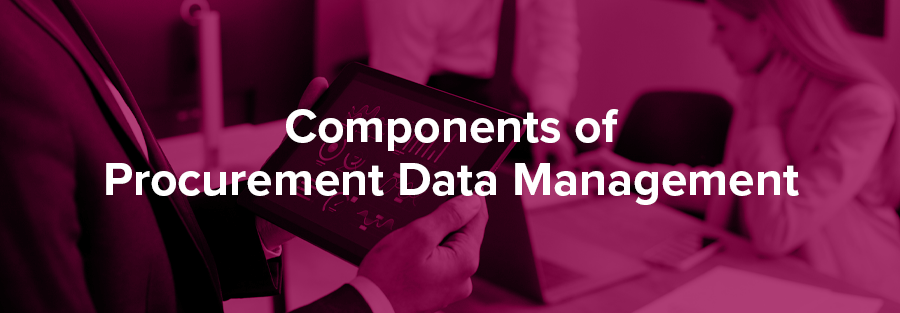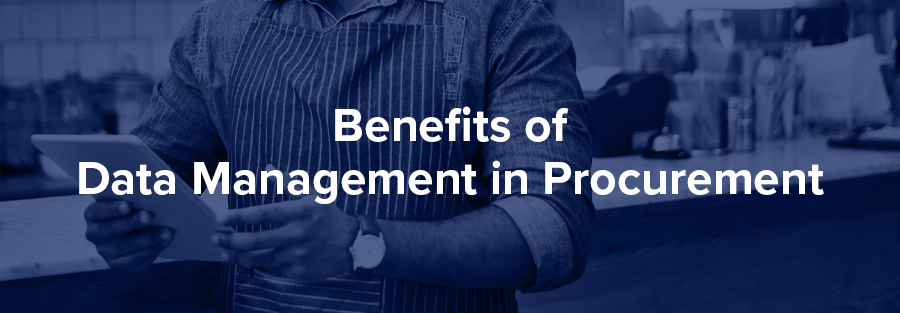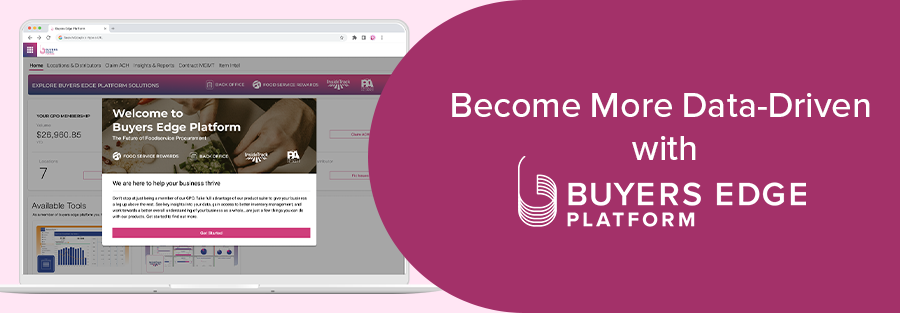Mastering procurement data management isn’t just about efficiency—it’s the secret ingredient to making informed decisions that resonate with the unique demands of foodservice.
Article Summary:
- What is procurement data management?
- Key components of procurement data management
- Benefits of Data Management in Procurement
- What technologies offer procurement data management?
- Frequently Asked Questions
What is procurement data management?
Procurement data management refers to the systematic process of collecting, organizing, and analyzing data related to the procurement activities of an organization. This includes the acquisition of goods and services from external suppliers.
The goal of procurement data management is to enhance decision-making, improve efficiency, and streamline the procurement process by leveraging insights derived from data.

Exploring this type of data management means understanding the multifaceted procurement process. Throughout the dynamic foodservice ecosystem, businesses must navigate strategic stages of procurement to stay ahead.
- Identifying Strategic Needs: Initiate the procurement journey by precisely identifying and articulating strategic needs, laying the foundation for effective data management.
- Strategic Planning & Budgeting: Elevate the process through strategic planning and budgeting, ensuring alignment with organizational goals and optimizing the procurement budget.
- Supplier Landscape Exploration: Navigate the expansive supplier landscape through thorough research, identifying potential partners, and gathering essential data for informed decision-making.
- Negotiation Mastery & Contractual Precision: Harness negotiation skills and ensuring contractual precision to secure favorable terms, a pivotal step in the procurement data management spectrum.
- Cultivating Supplier Relationships: Foster robust relationships with suppliers, a continuous process that enhances collaboration, transparency, and data-sharing for optimal procurement outcomes.
- Quality Assurance Vigilance: Vigilantly perform quality assurance checks to uphold product or service standards, a crucial element in maintaining data integrity throughout the procurement lifecycle.
- Inventory Optimization and Availability Assurance: Strategically ensure the availability of essential inventory, aligning with demand fluctuations, and optimizing stock levels, integral to a seamless data management strategy.
Understanding the nuances of the procurement process is key to mastering procurement data management, ensuring businesses navigate each stage with precision and effectiveness.

Key components of procurement data management may include:
- Data Collection: Gathering information related to supplier details, pricing, terms, contract information, and other relevant data points.
- Data Organization: Structuring the collected data in a logical and accessible manner, often utilizing databases or specialized software, to ensure easy retrieval and analysis.
- Data Analysis: Examining the collected data to derive meaningful insights. This can involve identifying cost-saving opportunities, evaluating supplier performance, and assessing overall procurement efficiency.
- Risk Management: Assessing and mitigating risks associated with procurement activities, such as supplier reliability, market fluctuations, and regulatory compliance.
- Strategic Decision-Making: Using data-driven insights to make informed decisions regarding supplier selection, contract negotiations, and overall procurement strategies.
- Automation: Implementing technology solutions to automate routine tasks, reducing manual efforts and improving accuracy in data handling.
In essence, data management plays a crucial role in modern business operations, enabling organizations to optimize their procurement processes, reduce costs, and make strategic decisions based on a thorough understanding of relevant data.

Benefits of Data Management in Procurement
From streamlined operations to strategic financial prowess, each benefit serves as a cornerstone in empowering organizations to thrive in the dynamic landscape of supply chain management.
- Operational Streamlining: Unleash efficiency through data management.
- Holistic Procurement Insight: Navigate the procurement landscape with enhanced visibility.
- Strategic Financial Management: Unveil cost savings through data-driven practices.
- Proactive Risk Mitigation: Shield your operation with real-time risk management.
- Data-Powered Decision Making: Guide your procurement strategy through informed choices.
- Market Leadership Through Data Agility: Gain a competitive edge in procurement dynamics.
Embracing effective data management in procurement isn’t just about efficiency; it’s the key to steering your organization confidently through the complexities of supply chain management, ensuring success and resilience in a dynamic business landscape.
What technologies offer procurement data management?
Today, businesses have access to various technologies to help them manage their procurement data. Consider the following:
- Integrated Enterprise Solutions
- Strategic Insights Solutions
- Advanced Data Analytics Platforms
- SaaS Software

Buyers Edge Platform SaaS Solutions play a pivotal role in elevating procurement data management through various key features:
Centralized Data Hub
Our SaaS solutions provide a centralized location for procurement data, allowing easy access, organization, and management of critical information related to suppliers, products, and transactions.
Real-Time Visibility
Buyers Edge Platform offers real-time visibility into procurement, enabling stakeholders to monitor transactions, track deliveries, and stay informed about the entire procurement lifecycle.
Data Accuracy and Consistency
With robust data validation and management features, our SaaS solutions ensure accuracy and consistency across all procurement data, mitigating errors and enhancing the reliability of information.
Strategic Decision Support
Leveraging advanced analytics and reporting tools, Buyers Edge Platform assists in making strategic decisions based on data-driven insights, contributing to more informed supplier selections, negotiation strategies, and overall procurement planning.
Workflow Optimization
Our solutions streamline procurement workflows, automating routine tasks, and reducing manual efforts. This optimization contributes to increased efficiency in the procurement process.
Supplier Relationship Enhancement
Buyers Edge Platform SaaS solutions facilitate effective supplier relationship management by providing comprehensive supplier profiles, performance metrics, and collaboration tools, fostering stronger and more beneficial partnerships.
Cost Savings Identification
Through data analytics, our solutions help identify cost-saving opportunities, negotiate favorable terms, and optimize procurement budgets, contributing to financial efficiency.
Regulatory Compliance
By incorporating compliance features, Buyers Edge Platform ensures that procurement activities align with regulatory standards, reducing the risk of non-compliance and associated challenges.
Take control of your organization’s procurement data management by leveraging our robust technology and SaaS Solutions designed to enhance efficiency, accuracy, and strategic decision-making throughout the procurement lifecycle.
Get in touch with a procurement expert from Buyers Edge Platform today!
Frequently Asked Questions
What is procurement? Procurement refers to the process of acquiring goods, services, or works from external sources, typically through purchasing or contracting. This strategic function involves various stages, including identifying needs, researching suppliers, negotiating contracts, and managing relationships. The goal of procurement is to obtain the required resources efficiently, at the right cost, and from reliable sources, ultimately contributing to the overall success and sustainability of an organization.
Is procurement different from purchasing? Yes, procurement and purchasing are related concepts, but they have distinct differences. Procurement is a broader term that encompasses the entire process of acquiring goods, services, or work. It involves a strategic approach that goes beyond just buying products. Procurement includes activities such as identifying needs, planning, researching suppliers, negotiating contracts, managing relationships, and ensuring the quality and availability of goods or services. Purchasing, on the other hand, is a specific subset of procurement. It focuses specifically on the transactional aspect of buying goods or services. Purchasing is a component of the overall procurement process and involves tasks such as placing orders, receiving goods, and handling invoices. While purchasing is a part of the procurement process, procurement is a broader and more strategic function that encompasses the entire lifecycle of acquiring goods, services, or works.
Is procurement data management different from vendor data management? Procurement data management and vendor data management are interconnected yet distinct aspects within the realm of supply chain operations. Procurement data management involves the comprehensive handling of data throughout the procurement process, encompassing information on suppliers, contracts, purchases, and various relevant data points. On the other hand, vendor data management specifically targets the effective organization and maintenance of data pertaining to vendors or suppliers. While procurement data management is a broader strategic function, vendor data management is a focused subset, involving activities such as vendor onboarding, performance tracking, and ensuring accurate and up-to-date vendor-related records. Together, these practices contribute to the efficiency and optimization of supply chain and procurement operations.
What is master data management? Master Data Management (MDM) is a methodological process that involves the comprehensive management and governance of an organization’s critical data. The primary objective of MDM is to provide a unified, accurate, and consistent view of key business data, often referred to as “master data,” across the entire organization. Master data typically includes information about customers, products, employees, suppliers, and other core entities that are fundamental to the organization’s operations.
What is procurement data analytics? Procurement data analytics involves the systematic analysis of various data sources within the procurement process, such as supplier information, purchases, contracts, and pricing. By employing analytical techniques and tools, organizations can derive valuable insights to inform decision-making. This practice includes scrutinizing spending patterns for cost-saving opportunities, evaluating supplier performance, staying abreast of market trends, managing risks, forecasting demand, ensuring contract compliance, and optimizing overall operational efficiency. Procurement data analytics empowers organizations to make informed, strategic decisions, enhance supplier relationships, and streamline procurement processes for greater effectiveness and financial efficiency.
